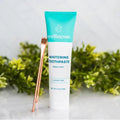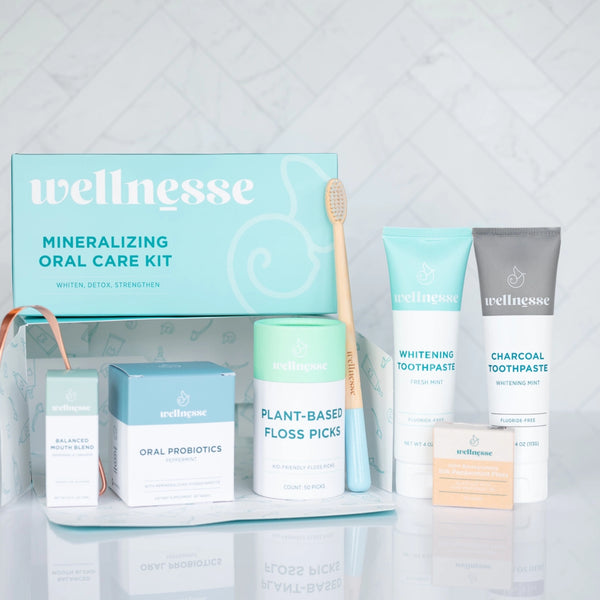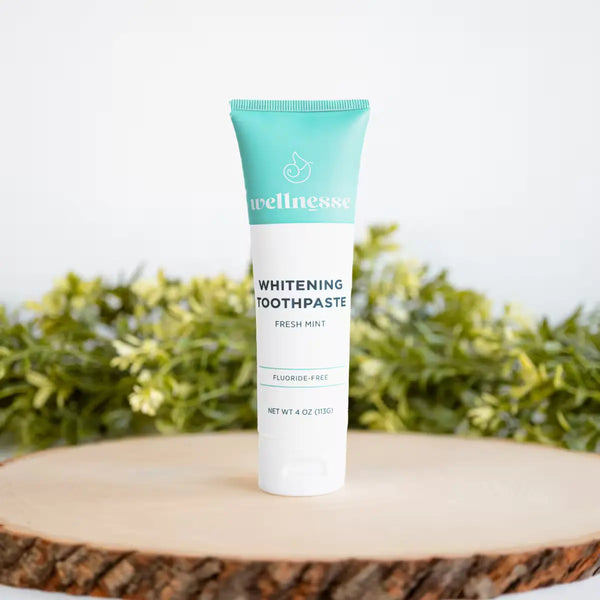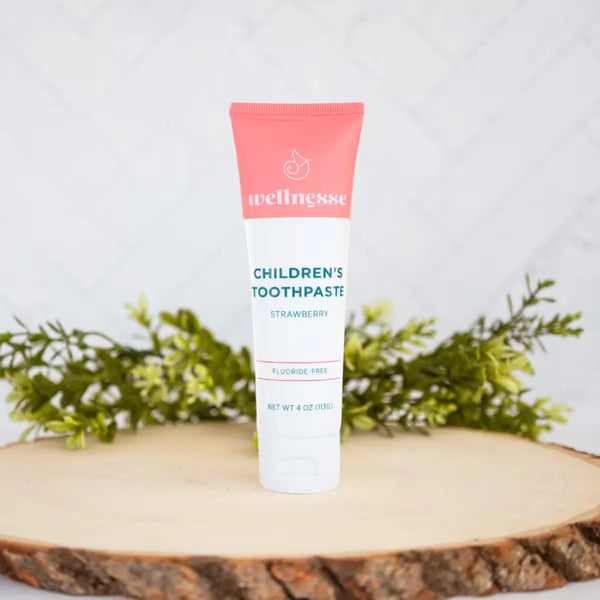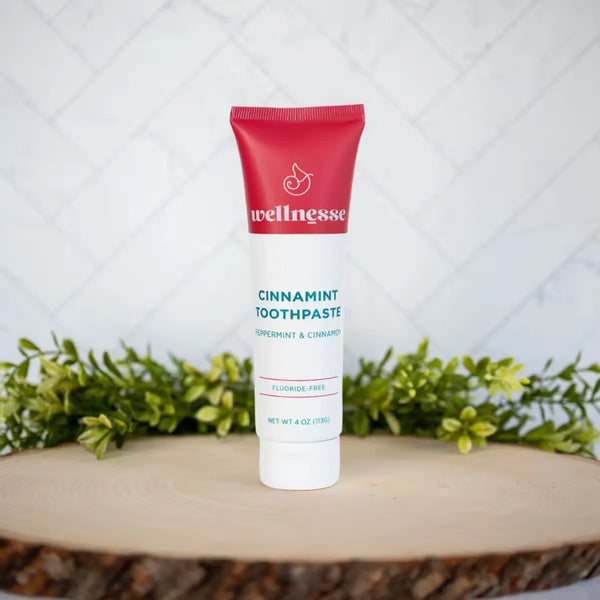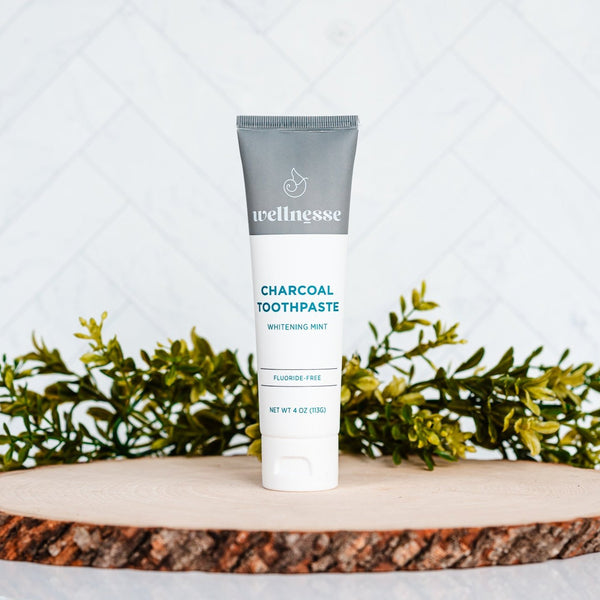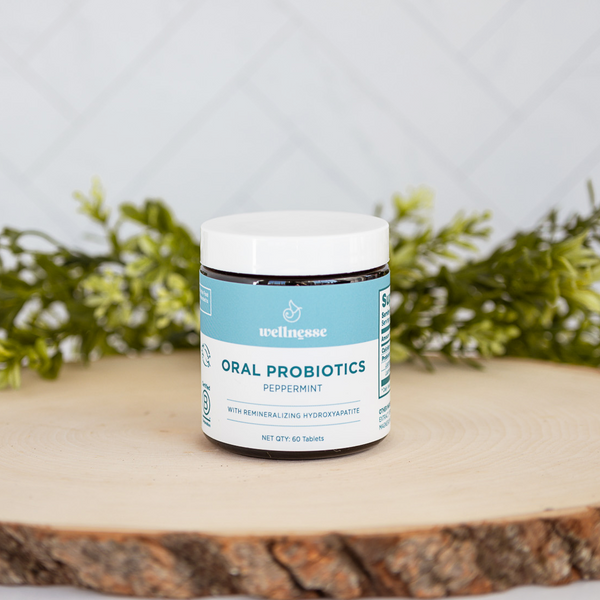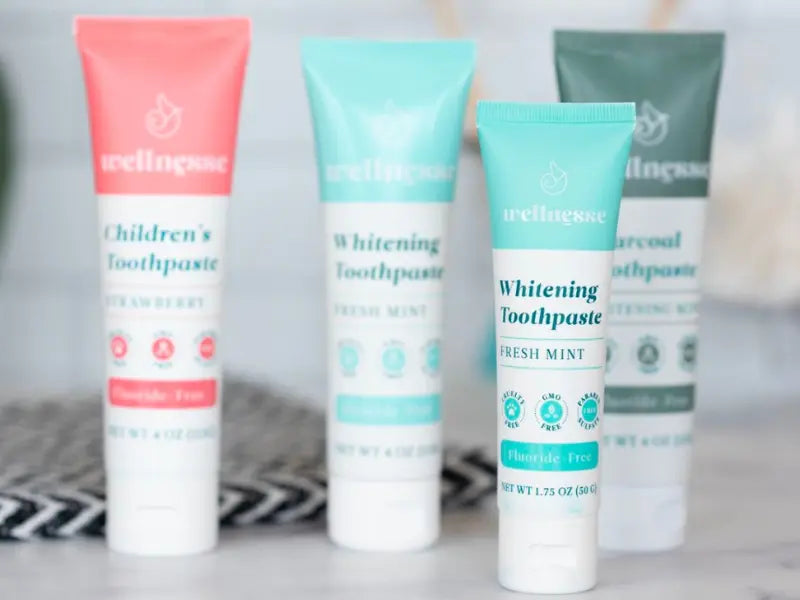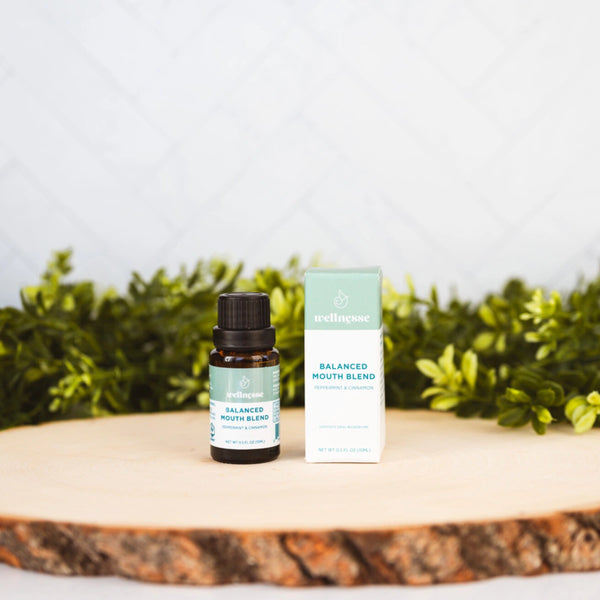Tooth enamel is the hard, mineral-rich outer layer of our teeth. Enamel is primarily composed of hydroxyapatite, making it the hardest substance in the human body. Yet enamel isn’t indestructible. Acids can cause it to lose minerals, leading to softening, white spot lesions, and eventually cavities if unchecked. If acids overwhelm these natural defenses, net demineralization occurs and enamel weakens. Enamel cannot regenerate once completely eroded or when a cavity has formed, as it lacks living cells. But early-stage enamel weakness can be repaired through remineralization.
The Role of Nutrition in Strengthening Tooth Enamel
Foods for Strong Teeth
The foods you choose daily can directly affect how well your body can restore lost enamel. Leafy greens, dairy products, nuts, and seeds offer essential minerals like calcium and phosphorus, which are the building blocks of enamel. Fermented foods support gut health and indirectly help your body absorb minerals more efficiently. Fresh vegetables like carrots and celery also stimulate saliva production while delivering vitamins that enhance oral defense. Adding crunchy fruits and mineral-rich foods to your meals can significantly contribute to the durability of your enamel. These are just a few powerful foods for strong teeth that fit easily into any balanced diet.
Best Vitamins for Teeth
A truly effective oral care routine extends beyond brushing. Your internal health matters just as much as your external habits. Below are the most beneficial vitamins and minerals for oral health:
- Vitamin D: Often referred to as the “sunshine vitamin,” vitamin D is a critical facilitator of calcium absorption in the intestines. Without sufficient vitamin D, the body cannot properly utilize calcium, which directly affects the strength and density of tooth enamel. Beyond its role in calcium metabolism, vitamin D also supports the immune system, helping reduce inflammation and prevent gum infections like gingivitis or periodontitis. People with chronic gum disease or frequent cavities often show suboptimal vitamin D levels. Exposure to sunlight is one natural way to boost levels, but for many, especially in colder climates, supplementation becomes necessary.
- Vitamin K2: Vitamin K2 plays a specialized but vital role in directing calcium to the right places while preventing it from being deposited in soft tissues such as arteries or joints. This function makes it particularly important for oral health, as it ensures that dietary calcium contributes to enamel strength rather than causing systemic issues. K2 activates a protein called osteocalcin, which binds calcium to the bone matrix and dental structures. Without adequate K2, even high calcium and vitamin D levels may not reach their full potential. For this reason, K2 is often referred to as the “traffic director” of calcium, ensuring it supports skeletal and dental health efficiently.
- Vitamin C: Collagen is the primary structural protein in gum tissue, ligaments, and connective tissue that anchors teeth in place. A deficiency in vitamin C can lead to bleeding gums and a weakened periodontal structure. Even in milder deficiencies, low vitamin C levels can delay wound healing and increase the susceptibility of gums to infection. Because the mouth is constantly exposed to bacteria and micro-injuries from chewing or dental work, strong collagen networks are crucial for resilience and recovery. In addition to its structural support, vitamin C also acts as a powerful antioxidant, protecting oral tissues from oxidative stress caused by environmental toxins.
- Magnesium: This serves as a regulatory nutrient that helps manage the balance and use of other key minerals like calcium and phosphorus, which are foundational to enamel and bone strength. It acts as a biological cofactor in over 300 enzymatic processes, including those involved in forming and maintaining tooth structure. In the mouth, this can result in weaker enamel, slower healing from gum procedures, and an increased risk of decay.
By prioritizing systemic support through daily nutrition or smart supplementation, you create a foundation for fewer dental issues over time. A well-supported body naturally translates to a more resilient smile.

Saliva Support Through Diet and Hydration
Saliva helps neutralize acids and delivers minerals directly to the enamel’s surface. Staying hydrated throughout the day helps maintain a steady flow of saliva, especially when water is your preferred drink. Eating foods with a high water content also helps keep saliva levels steady. Foods rich in zinc and B vitamins can further enhance salivary function. A dry mouth often increases the chance of decay because it allows acid to remain on teeth longer. By supporting healthy saliva production, your body is better equipped to prevent enamel erosion naturally.
Reducing Acid Exposure
Frequent snacking may seem harmless, but every bite can restart the acid cycle in your mouth. When you eat often, bacteria feed on the leftovers and release acids that damage enamel. It’s not just what you eat, but how often you eat that matters. Allowing longer gaps between meals gives your saliva enough time to neutralize acids and begin repairing enamel. Choosing whole meals instead of grazing throughout the day helps protect your teeth. Managing your eating pattern is a simple, often overlooked step to support natural enamel repair with minimal effort.
Natural Oral-Care Products for Remineralization
Non-Fluoride Oral Products That Rebuild Enamel
Many people are now turning to fluoride-free options to avoid potential sensitivities or chemical exposure. Modern formulations offer alternatives that effectively rebuild enamel using calcium phosphates, nano-hydroxyapatite, and xylitol. These components help replenish minerals and support the structure of weakened enamel without relying on fluoride. Xylitol, in particular, disrupts bacterial activity while promoting moisture and pH balance. Calcium-based ingredients mimic your natural enamel and help reinforce its integrity over time.
Choosing a Natural Fluoride-Free Toothpaste
When exploring gentle, effective options, natural pastes without fluoride stand out for their ingredient transparency. These toothpastes often utilize plant extracts and essential oils to provide cleaning power and support for the enamel. Ingredients like bentonite clay or baking soda can remove buildup without being too abrasive, while herbal oils, such as clove or tea tree, may help balance the bacteria. Choosing no-fluoride toothpaste gives you the opportunity to avoid synthetic additives while maintaining a high level of oral cleanliness. These products are ideal for individuals seeking purity in their hygiene routine.
Fluoride-Free Toothpaste for Sensitivity
Specialized fluoride-free pastes, designed for sensitive mouths, utilize ingredients such as potassium nitrate or hydroxyapatite to alleviate discomfort while gently polishing the teeth. Some formulas include charcoal, silica, or gentle minerals that help lift surface stains without scratching enamel. Fluoride-free whitening toothpaste allows users to manage discomfort while still achieving a brighter appearance.
Organic Toothpaste for Adults
Adults looking for eco-conscious and health-friendly options often prefer toothpaste with certified organic ingredients. These skip artificial preservatives and dyes in favor of botanical extracts and mineral boosters. Coconut oil, aloe vera, and neem are common additions that nourish gums while providing antimicrobial benefits. Products in this category aim to promote a cleaner mouth using fewer synthetic ingredients.
At-Home Dental Remineralization Treatments
Using Remineralizing Gels and Varnishes
These treatments are typically left on the teeth for several minutes to allow maximum absorption. They're ideal for nighttime use or after meals high in sugar or starch. By incorporating a dental remineralization treatment into your daily schedule, you give your enamel a fighting chance to heal and defend against everyday wear caused by eating.

Enhancing Mineral Uptake With Custom Trays
One of the most effective ways to deliver minerals directly to your enamel is through custom-fitted trays. These trays keep the remineralizing agents in close contact with your teeth for extended periods. This prolonged exposure enhances absorption and facilitates deeper penetration into the enamel layers. People with early decay can benefit from this highly targeted method. While simple to use, this approach is powerful and often recommended between dental visits. If you’re seeking to remineralize teeth without fluoride, tray-based applications may be one of the most effective home tools available.
Holistic Natural Mouth Care Practices
Oil Pulling
Oil pulling is an ancient Ayurvedic practice gaining modern popularity for its gentle cleansing properties. The process involves swishing a tablespoon of oil in the mouth for about 10 to 20 minutes before spitting it out. This action traps and removes harmful bacteria while helping maintain a more neutral pH in the mouth. Regular oil pulling may reduce plaque buildup, support gum health, and lessen bad breath, all without relying on harsh chemicals. This practice is a valuable part of natural mouth care routines.
Herbal Toothpaste
Toothpaste containing botanical ingredients can help clean teeth without synthetic additives. Many of these formulations feature herbs like neem, clove, and myrrh, which are known for their antimicrobial and soothing qualities. These natural compounds help manage bacteria while calming irritated gums and freshening breath. Since these often avoid foaming agents and artificial colors, they’re especially suitable for sensitive users or those avoiding chemical exposure. Incorporating herbal toothpaste for sensitive teeth into your regimen offers an effective, plant-based alternative that aligns with holistic oral hygiene goals while providing solid support against enamel-stressing factors.
Timing Brushing After Meals
Maintaining a healthy brushing routine is fundamental for oral hygiene, but the timing of your brushing can significantly affect enamel integrity. Below is a guide:
- Wait Before Brushing: Although brushing after meals feels intuitive, it’s best to wait at least 30 minutes before reaching for your toothbrush. Immediately following a meal, your mouth undergoes a temporary pH drop, softening the outermost layer of enamel. Brushing during this time can erode enamel more quickly, leading to thinning, sensitivity, and long-term weakening. By allowing a half-hour pause, your saliva has a chance to naturally rebalance pH and begin the remineralization process, restoring strength to the enamel surface. If you feel the urge to clean your mouth sooner, consider non-abrasive alternatives, such as rinsing with water or chewing sugar-free gum, to stimulate saliva flow. Building this 30-minute buffer into your routine offers a simple but powerful way to preserve your enamel over time without disrupting your overall oral hygiene plan.
- Rinse With Water: Water helps flush out lingering food particles and reduce bacterial activity. It’s an especially smart move during the 30-minute post-meal window when brushing is not yet advisable. Rinsing with water also helps regulate pH levels, supporting the remineralization process as saliva steps in to protect tooth surfaces. Unlike mouthwashes that may contain alcohol or antibacterial agents, water does its job without introducing potentially irritating ingredients, making it ideal for frequent use throughout the day. Opt for a cool or room-temperature rinse rather than very hot or cold water, as extreme temperatures can cause sensitivity in weakened enamel.
- Use a Soft-Bristled Brush: Bristle texture plays a crucial role in determining how gentle or abrasive your brushing technique is. Using a soft-bristled toothbrush helps clean teeth effectively without inflicting unnecessary wear, making it the preferred choice for nearly all oral hygiene routines. Soft bristles flex with pressure and contour around tooth surfaces, reaching plaque and debris without scraping.
Developing an enamel-conscious brushing routine involves making thoughtful adjustments to your timing and product selection.
Professional Support and Preventive Care
Regular Dental Visits
Scheduling regular dental checkups is essential for maintaining good oral health. Professional examinations enable your dentist to detect early signs of mineral loss before they become significant issues. With diagnostic tools like digital X-rays and laser cavity detection, dentists can spot subtle changes in enamel that are not visible to the naked eye. These visits also allow for professional cleanings, which eliminate buildup that contributes to acid formation. If you're looking to reverse early tooth decay, routine care under the guidance of a trained professional is one of the most proactive steps you can take.
In-Office Fluoride-Free Remineralization Options
Many dental offices now offer fluoride-free solutions for patients who prefer natural alternatives. The result is a stronger enamel surface that’s more resistant to future breakdown. These interventions are ideal for people with sensitivities or those choosing to avoid fluoride altogether. In-office fluoride-free toothpaste brands can be paired with such treatments to create a comprehensive routine.
Sealants and Physical Barriers for Vulnerable Teeth
Some areas of your mouth are more susceptible to decay. To protect these vulnerable zones, your dentist may recommend sealants, which are thin coatings applied directly onto the chewing surfaces of teeth. These sealants act as shields, blocking food particles and bacteria from settling in hard-to-reach spaces. While commonly used in children, sealants are equally beneficial for adults prone to enamel loss. Combining sealants with organic toothpaste for adults can extend the lifespan of dental surfaces and prevent recurring damage.

Long-lasting enamel strength depends not just on what you do occasionally, but on what you commit to daily. Regularly adopting supportive routines can help prevent long-term enamel erosion. It’s also beneficial to reassess your habits periodically, adjusting based on any changes in diet, health, or lifestyle. If you value gentle and practical solutions, incorporating natural fluoride-free toothpaste or other mindful products ensures you're aligning with a cleaner approach to oral hygiene. With steady attention and care, your enamel can remain resilient for years to come.
Sources:
Larson, Jennifer. “How Hydroxyapatite Toothpaste Helps Tooth Remineralization.” Healthline, 7 Apr. 2021, www.healthline.com/health/dental-and-oral-health/hydroxyapatite-toothpaste.
